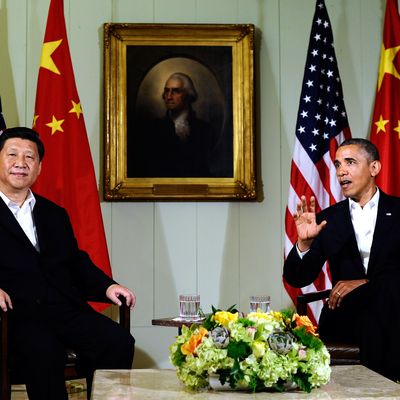
You probably missed some pretty big news over the weekend: China and the United States agreed to phase out the use of hydrofluorocarbons, or HFCs. If you’re old enough to remember the ozone scare, that was mostly caused by chlorofluorocarbons, or CFCs. A 1987 agreement banned those, giving rise to HFCs as a replacement, which don’t cause an ozone hole but do heat up the atmosphere a lot.
Why is this a big deal? On its own terms, it will do a lot to restrain global warming, eliminating perhaps half a degree Celsius of expected warming over a century.
But it probably matters more as a future indicator. Basically, the save-the-planet game plan involves a series of steps. First, the Obama administration has to craft a plan to regulate existing power plants. Then that plan has to survive the inevitable conservative legal challenge (which is why Obama’s belated steps to fill vacancies on the D.C. Circuit, the court where a challenge will be heard, is so vital). Finally, having put in place a credible plan to meet its international climate goals, then the United States can negotiate a global climate treaty in 2015.
The last part is probably the trickiest. The United States is the worst carbon polluter in the world, but most of the growth in future emissions is expected to come from developing countries, most prominently China, that are rapidly moving people from farms to factories. China’s willingness to negotiate poses the biggest obstacle. The U.S. will never get a global agreement without meeting its own targets first, but meeting its own targets alone won’t be enough. One of the more sophisticated conservative arguments for doing nothing on the climate is that China won’t deal, so there’s no point.
But the HFC deal with China suggests otherwise. Which means that saving the planet remains a very live option.






























